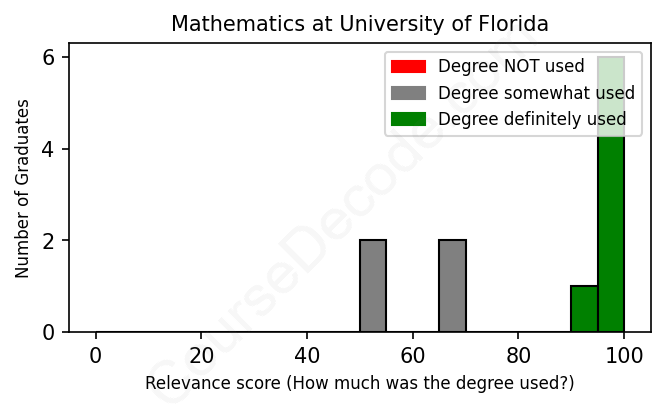
First, some facts. Of the Mathematics graduates from University of Florida we've analyzed , here's how many have used (or NOT used) their degree in their career:

These are estimates based on AI analysis of 11 LinkedIn profiles (see below).
The verdict? Significantly above average. Overall, with an average relevance score of 83%, Mathematics graduates from University of Florida have a much higher likelihood (+16%) of finding work in this field compared to the average graduate across all fields:
And for comparison, here's the chart for all profiles we've looked at across all degrees.
Also, after graduating, 45% of these graduates have pursued further education other than another Bachelor's degree (such as a Masters degree or other), compared to the average across all profiles of 35%. This suggests you may need more than just a Bachelors degree to be competitive as a Mathematics graduate.
See the details:
|
Relevance score: 100% We think this person has gone into a career highly relevant to their degree. We think this person has gone into a career highly relevant to their degree.
DEGREE INFOGraduated in 2020 from University of Florida with a Bachelor of Science - BS in Mathematics. Also pursued further education since (see below). JOB HISTORY SINCE GRADUATIONMathematical Modeling Intern AbbVie May 2022 - Aug 2022 FURTHER DEGREES DONE SINCE GRADUATINGDoctor of Philosophy - PhDUniversity of Illinois Chicago 2020 - 2025 ABOUTNo information provided. |
The top 10 most common jobs done by the graduates we've analyzed (ranked most common to least) are:
It seems like people who graduated with a Mathematics degree from the University of Florida have landed a diverse array of jobs, but there are some common trends. A lot of graduates seem to find roles in tech, especially software engineering, where they can apply their analytical skills to solve complex problems. Positions like Software Engineer and Senior Analyst show that a solid understanding of math really comes in handy, especially for algorithm development and data-driven decision-making. On the flip side, there are also a good number of graduates who went into teaching. Roles like Mathematics Teacher and Math Coach indicate that some folks are passionate about sharing their math knowledge with the next generation, even if it’s more about basic concepts rather than higher-level theories.
When we look at the relevance of these jobs to their Mathematics background, it’s a mixed bag. While tech roles and some analyst positions are directly aligned with mathematical principles, others, like those at companies like Twitter or in roles like Financial Analyst, may not utilize advanced math skills to the extent they studied in their degree. Ultimately, it seems that math grads from UF have found success across various fields, but the level of relevance to their degree varies. It’s clear that whether they’re coding at a major tech firm or teaching high school math, those problem-solving skills and logical thinking that come from a math background are super valuable, even if they aren’t always explicitly used in their day-to-day work.
Here is a visual representation of the most common words in job titles for Mathematics graduates (this is across all Mathematics graduates we've analyzed, not just those who went to University of Florida):

Looking at all these profiles, it's pretty clear that graduates from the University of Florida with a degree in Mathematics are finding themselves in a variety of interesting and relevant careers. Right after graduation, many appear to kickstart their professional life with roles that utilize their quantitative skills, such as internships at big names like the National Security Agency and Twitter, or even positions like Teaching Math. Over the years, quite a few graduates have transitioned into solid roles in tech and analytics—think software engineering at Google and positions within airlines focusing on pricing strategies. People seem to land in jobs that not only take advantage of their math skills but also offer good growth potential.
Five or ten years down the line, it's encouraging to see that many alumni have moved up the ranks in their respective fields. Positions like Senior Software Engineer, Director of Pricing, and International Economist suggest that these graduates are not just settling for any job; they’re climbing the career ladder and making significant contributions in tech, finance, and education. Even those who initially took paths that seem less directly related to mathematics, like teaching or independent contracting, still show a knack for upgrading their roles into more analytical positions as they gain experience. Overall, it looks like most of these graduates are doing pretty well, carving out decent careers that often leverage their math background effectively, rather than drifting into unrelated fields.
Getting a Bachelor’s degree in Mathematics can be pretty challenging, but it really depends on your background and how much you enjoy the subject. At the University of Florida, like many other places, you’ll tackle a lot of abstract concepts, proofs, and problem-solving techniques that can feel intimidating at times. If you’re all about numbers and enjoy tackling complex problems, it might not feel as hard, but for those who find math tricky, it can be a bit of a slog. Overall, it’s probably on the tougher side of the average degree, but with the right mindset and study habits, it’s definitely manageable!
Most commonly, in the LinkedIn profiles we've looked at, it takes people 4 years to finish a Bachelor degree in Mathematics.
Looking at these University of Florida math grads, it seems like they've had some pretty decent financial vibes going on, especially those who jumped into tech and analysis roles. For instance, the ones who ended up at big companies like Google and Spirit Airlines definitely likely raked in some solid salaries, especially as they moved up the ranks into senior and managerial positions. Even the ones doing more educational roles seem to be finding their way, though teaching usually doesn’t pay as much in comparison. The more recent grads are still in the early stages, but they’ve started with internships and contract jobs that can lead to good opportunities. Overall, while not every path screams "wealth," many of these folks seem to be on a better-than-average track when it comes to earnings.
Here is a visual representation of the most common words seen in the "about" section of LinkedIn profiles who have a Bachelor degree in Mathematics (this is across all Mathematics graduates we've analyzed, not just those who went to University of Florida). This may or may not be useful:

Here are all colleges offering a Bachelor degree in Mathematics (ordered by the average relevance score of their Mathematics graduates, best to worst) where we have analyzed at least 10 of their graduates:
| College | Score | Count |
|---|---|---|
 University of Florida University of Florida
|
83 | 11 |
 Penn State University Penn State University
|
74 | 13 |
 The University of Texas at Austin The University of Texas at Austin
|
68 | 23 |
 University of Washington University of Washington
|
68 | 27 |
 University of California, Berkeley University of California, Berkeley
|
66 | 10 |
 University of Minnesota-Twin Cities University of Minnesota-Twin Cities
|
65 | 15 |
 California Polytechnic State University-San Luis Obispo California Polytechnic State University-San Luis Obispo
|
64 | 11 |
 University of North Texas University of North Texas
|
51 | 11 |
 University of California, Riverside University of California, Riverside
|
44 | 11 |